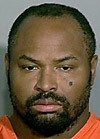Originally published Thursday, December 3, 2009 at 12:07 AM
![]() Comments (0)
Comments (0)
![]() E-mail article
E-mail article
![]() Print
Print
![]() Share
Share
Jerry Large
Looking at the whys of tragedy
It's easy to look at a crime in terms of good and evil rather than taking time to look at why it happened.
 |
Seattle Times staff columnist
When the attention we're paying to Sunday's shootings burns out, will we have taken steps to prevent another tragedy?
It's easy to look at a crime in terms of good and evil rather than taking time to look at why it happened.
Trying to understand the whole story is often denigrated as making excuses. But if we don't ask why someone behaved the way they did, we may miss the next person on the brink and won't know how to stop it from happening — over and over.
We'll have less violence if we are willing to focus more attention on the underlying causes of violence.
Every case is different, but one common and addressable contributing factor is the mental state of the criminal.
Nearly 30 percent of Americans have a mental-health disorder, substance-abuse disorder or both.
Most are neither violent nor criminal, but there will always be a few who cause significant damage to themselves and the rest of us.
We need to better identify the warning signs when mental illness might lead to violence and to develop effective ways to prevent disaster.
Our mental-health system has improved — sometimes because of the very violence it failed to prevent.
King County and Seattle Municipal Courts have mental-illness courts that divert people to treatment in cases where that is possible. But their capacity is limited.
We took a step forward after a tragic stabbing in 1997, which led the Legislature in 2005 to allow counties to raise local sales taxes 0.01 percent to augment state funding for mental-health and chemical-dependency services.
But the bad economy is eating into that small increase. There's less sales tax money and fewer dollars for mental-health treatment when people aren't buying.
![]()
In that case, Seattle Fire Capt. Stan Stevenson was stabbed to death by Dan Van Ho, a few days after Ho was released from jail despite warnings from psychiatrists.
We also need treatment alternatives for those who fall between the justice system and the health-care system.
In the case of Maurice Clemmons, the man suspected of slaying four Lakewood police officers, it was his wife who first got counseling for him, though it was sporadic.
Months later, Pierce County officials had him evaluated at Western State Hospital, where a psychiatrist found him competent to stand trial on pending felony charges. But legal competency doesn't mean a person is mentally healthy.
Often, for people whose mental illness isn't bad enough to have them placed in a state hospital, the choices are freedom or jail. We ought to have more options for holding on to people who fall into the gray area between the medical and justice systems.
I called Susan Rynas, who has a daughter with mental illness. Rynas and her husband, Mike, are co-founders of the East King County chapter of the National Alliance for the Mentally Ill. Susan Rynas leads a support group for families of people who have a mental illness.
She said the families she sees have difficulty getting help for relatives. Sometimes official intervention happens only after a person has committed a crime.
"It is sheer madness that our society treats our 'brains' as something completely separate from the rest of our bodies," she said.
"Mental illnesses are brain disorders. If a person is having a heart attack, that person would be hospitalized and given medical attention."
But too often we leave mentally ill people to the criminal-justice system, sometimes after it's too late to help them or us.
No system could prevent every violent act, but systems we have now let too many past. We blame the people involved rather than changing systems.
Rynas says the social part of our culture hasn't caught up with recent scientific advances.
It's true. We'll ask for better systems when our analysis is extended beyond simple good versus evil.
Are we sick enough of seeing tragic headlines to demand something better?
Jerry Large's column appears Monday and Thursday. Reach him at 206-464-3346 or jlarge@seattletimes.com.
NEW - 10:00 PM
Jerry Large: It's time to change Seattle schools superintendent's job
Jerry Large: Clear view of China from Tibet
I try to write about the intersections of everyday life and big issues. I like to invite readers to think a little differently. The topics I choose represent the things in which I take an interest, and I try to deal with them the way most folks would, sometimes seriously, sometimes with a sense of humor. My column runs Mondays and Thursdays.
jlarge@seattletimes.com | 206-464-3346

Entertainment | Top Video | World | Offbeat Video | Sci-Tech
general classifieds
Garage & estate salesFurniture & home furnishings
Electronics
just listed
More listings
POST A FREE LISTING



